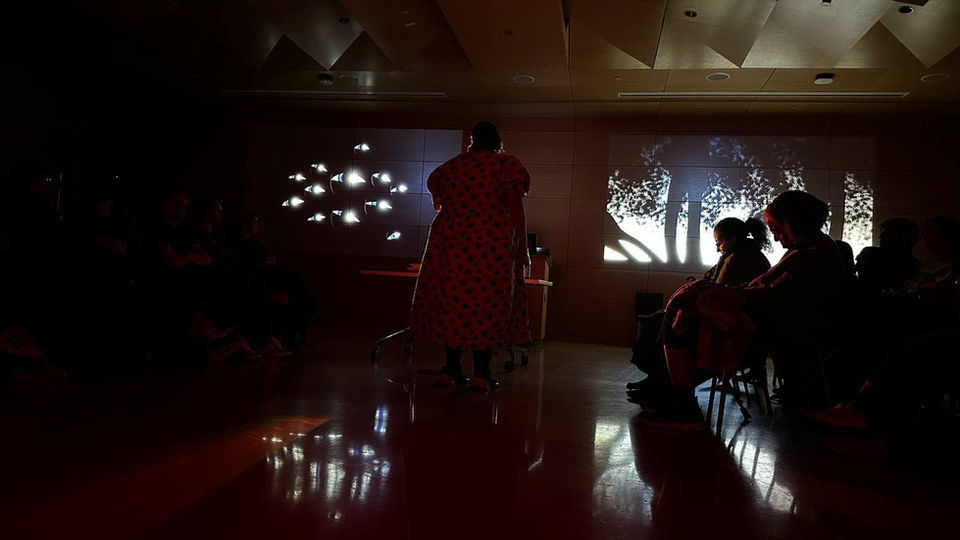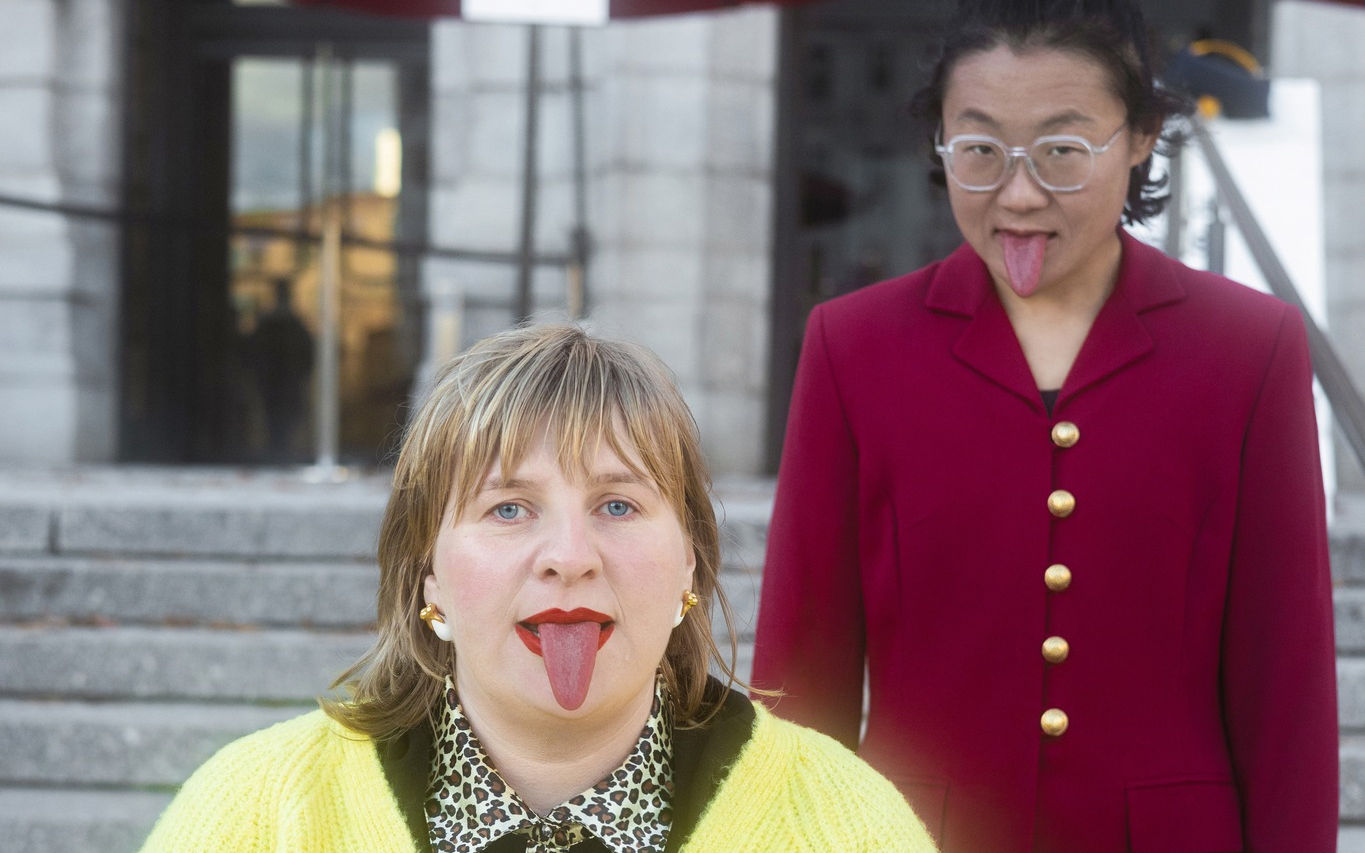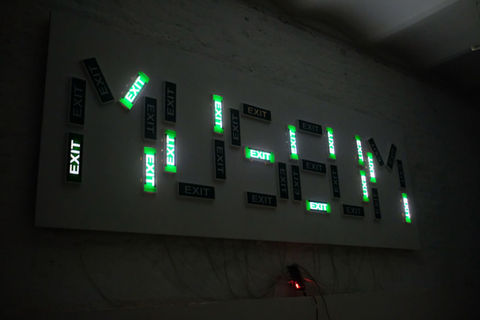Art Practice
Statement
My art practice centres around critical exploration of culture and knowledge production via methods of performance, social practice and institutional interventions. As an interdisciplinary artist, I intentionally don’t separate art, research, and my curatorial practice, and find the intersection of the three profitable for my work.
In addition to my first degree in liberal arts and training in philosophy, I received an MA in social sciences and was deeply encouraged by methods of anthropology. For the ‘Invisible Visibility’ exhibition (Street Art Museum and Helsinki Art Museum, 2018), I collaborated with the local sticker art community both as an artist and researcher. For my PhD dissertation, I studied laborers of cultural institutions. These materials and the tradition of institutional critique inspired two of my projects. First, in collaboration with Viktor Kudrjashov, I created a media installation ‘The Privilege of Presence’ (Garage Museum, 2020) to reflect on hidden hierarchies in museum space and how they were affected by Covid. To continue on the topic of invisibility, I authored a utopian digital manifesto of (no) future cultural institutions (2021).
My COVID experience and growing political restrictions in the Russian system of education led me to apply performance in public space as my method to work critically with ideas of high culture and the concept of enlightenment. In the {min}enlightenment (2021) series of performances I approached semipublic – semiprivate places as the new salons of enlightenment, and chose three types of them to carry out performative lecturers: a garage (literally ‘a tyre fitting salon’ in Russian), a spa salon and swimming pool, and a beauty salon. All three salons were open to all during the performance as I didn’t want to supplement their spatial organization, soundscape and social practices with mine. I considered the project, not a beautiful plant of education to cultivate, but rather weeds on enlightenment that grow sporadically, tolerate and to be tolerated by other plants, sounds, and agents.
I used the method of performative lectures to explore changing relations between space, body, and culture in the context of COVID travel in my next project ‘The Arrival’ (2021). The project was structured around auto ethnographic experience and a historical investigation of culture in motion. I delivered three performative lectures in the UK in places connected to migration: at the border between the UK and France, at an airfield, in Pushkin House, a London institution devoted to rebellious XIX century poet Alexander Pushkin, who had never been abroad. One of the most recent performative projects, UC Pinkies (2022) was a critical assessment of opportunities for public education in a non-university environment in the US context: I opened an alternative university in a nail salon called Pinkies in Berkeley, for one day.
My current research work is deeply embedded in museum materiality as a social space where cultural hierarchies are both maintained and subverted. One of the performances in production, The Guide of Souls is built on the character of museum babushkas (Russian: бабушка; granny, elderly lady), a typical invisible cultural worker in post-Socialist countries. These elderly ladies, who work as museum guards, have no power in the museum hierarchy but are extremely powerful because of their social position and type of femininity. Playing a babushka, I’ll engage museum visitors in a conversation about cultural production, politics and inequity. Another performance, If Museum Walls Could Talk recently commissioned by Stanford University is dedicated to revealing the "behind the scenes" political struggle for creativity and cultural expression in the context of wartime Russia. It draws upon a variety of less visible protest and dissent actions caused by the new wave of censorship and extreme police brutality. The performance is based on a collection of interviews I conducted with Russian cultural workers since the beginning of the war and self-ethnography.
INHALE/EXHALE
2025-ongoing
INHALE/EXHALE is a new installation by Kuleva with large helium balloons featured inside the RU space that explores migration as embodied identity and a bureaucratic process. This research-based project centers around self-ethnographic experience and interviews Kuleva conducted with artists and academics who had to flee their home countries due to political reasons. The interviews often describe the precarity of new migrant life through somatic features: holding breath, hardships to breathe, or deep inhales as a metaphor of freedom (in Russian: дышать полной грудью, breathe life freely).
The project takes visual inspiration from weather balloons as political messengers, which North Korea and South Korea exchange as one of the rare acts of communication between the countries. When weather balloons carrying political information from South Korean activists landed in North Korea, the latter retaliated to their opponents with household garbage. As a result, photographs of balloons carrying garbage over water and mountains flooded the media.
The installation is also a commentary on the state of academic and intellectual freedom in the U.S. It addresses the funding cuts affecting the National Oceanic and Atmospheric Administration under the Trump presidency, among many other studies.
The installation was showcased at Residency Unlimited (October 8-10, 2025) in New York.
If Museum's Walls Could Talk
2024-2025
If Museum's Walls Could Talk is dedicated to revealing "behind the scenes" political struggle for creativity and cultural expression in the context of wartime Russia. It draws upon a variety of less visible protest and dissent actions caused by the new wave of censorship and extreme police brutality. The performance is based on a collection of interviews I conducted with Russian cultural workers since the beginning of the war and self-ethnography.
The performance was shown at Stanford University, Pushkin House London, and, in its latest version, at The New School in New York City in November 2024.
Supporting team Gabriel Briggs-Fandek, Riitta Hakkarainen, Kostyantyn Polonskyi, Daria Trubarova
The Guide of Souls aims to celebrate the contribution of less visible cultural workers as museum guides. Seeing a museum as an institution uniquely balancing between the past – the world of the dead and the present or those living – we compare museum guides to psychopomps, spirits from Greek mythology who connect the two worlds, literally ‘guides of souls’.
The project is built on the character of museum babushkas, the typical invisible cultural worker in post-Socialist countries. These elderly ladies, who work as museum guards, have no power in the museum hierarchy but are extremely powerful because of the irsocial position and type of femininity, flipping the existing power structure.
In the Boston version of the performance, held on December 11th 2023, we played babushkas taken to the forefront of a museum. As living sculptures, guarding not only the exhibits but also the building itself, we got museum visitors involved in a conversation about cultural production, politics, and inequity.
Performers Margarita Kuleva, Olivia Maday, Guodong ‘Gordon’ Fu, Shuyan Dong
The Guide of Souls
2023
UC Pinkies
The world’s most beautiful university 2022
UC Pinkies was founded by Berkeley Pinkies nail salon, performance artist Margarita Kuleva and poet Polina Barskova. UC Pinkies is a walk-in welcome university that reimagines the future by challenging the world to shape the convention. It stands for more inclusive forms of public education, freedom of political expression, enlightenment with no intention of improving anyone, death of bureaucracy, and good nails. The public performance was organized as a series of acceptance interviews for anyone who would like to join the new university as a student, professor, or any kind of human or non-human entity.
The Arrival is a series of three performative lectures commissioned by Pushkin House (UK, London), exploring changing relations between space, body, and culture in the context of new travel. The project was structured around auto ethnographic experience and a historical investigation of culture in motion.
Supporting team Robin Mitchell, Alexander Uttu, Nikita Yurov
Stage design Riitta Hakkarainen
The Arrival 2021
The Back Office Manifesto: NO Future Institutions
2021

The Back Office Manifesto: Towards (NO) Future Institutions, one of the first cryptographic works based on scientific data, was published on Foundation.app, the leading platform for NFT art. This work is the result of a long-term ethnographic study of social inequality in visual art. This is a manifesto written on behalf of cultural workers who are often deprived of a voice and recognition. The manifesto represents auto pian version of the museum, existing in one possible future. In particular, according to the manifesto, in this museum "everyone is are searcher", and "the contribution of all human and non-human agents (including museum cats and ficuses) to its design and production is equally valuable.
In collaboration with Elena Penina & DAH group
On the 1st June 2021, Russia implemented the so-called law ‘On enlightenment activity’,regulating educational activity beyond official study programs. In respect to the new law, Margarita Kuleva and her students, decided to explore what enlightenment means now. In this experimental project, we not only protested against the new law, but looked for less hierarchical and more inclusive forms of public education in general.
{min}enlightenment is a mini-series of performative lectures in unsuitable places: auto-repair garages, swimming pools and beauty salons. These new public-private spaces supplement the traditional ‘Salons of Enlightenment’, and as thus, the project aims to widen its definition beyond the traditional Eurocentric perspective. All of the performances were streamed on YouTube. We are min and mean enlightenment. We will not make you better.
{min} enlightenment
2021
The Privilege of
Presence
2020
The Privilege of Presence is a media project by Margarita Kuleva and Viktor Kudryashov in the framework of the Garage Reflections project in May-June 2020. The project consists of an essay on cultural institutions during the pandemic and a media object, that was at the same time exhibited in Moscow (at Garage website) and Berthold art centre in Saint Petersburg, closed because of the pandemic. The media object was located in an empty exhibition hall, closed because of COVID. 34 light boxes ‘exit’ constituted the word ‘Museum’. The object was connected to the Garage Museum website and every time there was a new visitor at the website on the ‘exit’ light boxes was on. The audience could see how the object changes via live-streaming for a week.




























